The starting text for this
anagram is a section from the essay on Mt. Fuji in Exotics and Retrospective
by Lafcadio Hearn, an Irish writer who spent his last 14 years in the late 1800's
living in Japan, and is well-known for his writings about that country. This
is from section 6 of the essay "Fuji-no-yama" (whose entirety can be found
here) and tells the
story of one particular couple's adventure with the mountain, in the context of the
tale of Hearn climbing the mountain himself.
Below that is an anagram of this text into nine poems (one, #4, being a short
retelling of Hearn's story) inspired by nine images from Hokusai's famous series
of woodcuts, the Views of Mt. Fuji. Each poem is shown with its
accompanying image.
Squatting by the wood fire, I listen to the goriki and the station-keeper
telling of strange happenings on the mountain. One incident discussed I remember
reading something about in a Tokyo paper: I now hear it retold by the
lips of a man who figured in it as a hero.
A Japanese meteorologist named Nonaka attempted last year the rash
undertaking of passing the winter on the summit of Fuji for purposes of
scientific study. It might not be difficult to winter upon the peak in a
solid observatory furnished with a good stove, and all necessary
comforts; but Nonaka could afford only a small wooden hut, in which he
would be obliged to spend the cold season without fire! His young wife
insisted on sharing his labors and dangers. The couple began their
sojourn on the summit toward the close of September. In mid-winter news
was brought to Gotemba that both were dying.
Relatives and friends tried to organize a rescue-party. But the weather
was frightful; the peak was covered with snow and ice; the chances of
death were innumerable; and the goriki would not risk their lives.
Hundreds of dollars could not tempt them. At last a desperate appeal was
made to them as representatives of Japanese courage and hardihood: they
were assured that to suffer a man of science to perish, without making
even one plucky effort to save him, would disgrace the country; - they
were told that the national honor was in their hands. This appeal
brought forward two volunteers. One was a man of great strength and
daring, nicknamed by his fellow-guides Oni-guma, "the Demon-Bear," the
other was the elder of my goriki. Both believed that they were going to
certain destruction. They took leave of their friends and kindred, and
drank with their families the farewell cup of water - midzu-no-sakazuki
- in which those about to be separated by death pledge each other. Then,
after having thickly wrapped themselves in cotton-wool, and made all
possible preparation for ice-climbing, they started - taking with them a
brave army-surgeon who had offered his services, without fee, for the
rescue. After surmounting extraordinary difficulties, the party reached
the hut; but the inmates refused to open! Nonaka protested that he would
rather die than face the shame of failure in his undertaking; and his
wife said that she had resolved to die with her husband.
Partly by forcible, and partly by gentle means, the pair were restored
to a better state of mind. The surgeon administered medicines and
cordials; the patients, carefully wrapped up, were strapped to the backs
of the guides; and the descent was begun. My goriki, who carried the
lady, believes that the gods helped him on the ice-slopes. More than
once, all thought themselves lost; but they reached the foot of the
mountain without one serious mishap. After weeks of careful nursing, the
rash young couple were pronounced out of danger. The wife suffered less,
and recovered more quickly, than the husband.
The goriki have cautioned me not to venture outside during the night
without calling them. They will not tell me why; and their warning is
peculiarly uncanny. From previous experiences during Japanese travel, I
surmise that the danger implied is supernatural; but I feel that it
would be useless to ask questions.
The door is closed and barred. I lie down between the guides, who are
asleep in a moment, as I can tell by their heavy breathing. I cannot
sleep immediately; - perhaps the fatigues and the surprises of the day
have made me somewhat nervous. I look up at the rafters of the black
roof - at packages of sandals, bundles of wood, bundles of many
indistinguishable kinds there stowed away or suspended, and making queer
shadows in the lamplight. . . . It is terribly cold, even under my three
quilts; and the sound of the wind outside is wonderfully like the sound
of great surf - a constant succession of bursting roars, each followed
by a prolonged hiss. The hut, half buried under tons of rock and drift,
does not move; but the sand does, and trickles down between the rafters;
and small stones also move after each fierce gust, with a rattling just
like the clatter of shingle in the pull of a retreating wave.
[1]
Fuji's perfect outline points heavenward
near the river's mouth.
The firm peak in the warm sky
paints across the lake an odd reflection,
with dirt draped in snow
rather than brown land almost up to the top.
Perhaps the elder pedagogue of Edo
is making a subtle point.
The old boatman of Kai
rowing to the tranquil village there
And the middle-aged Buddhist
who once pined for youthful times
Endorse this bitter truth:
Seen on reflection, things are often changed.
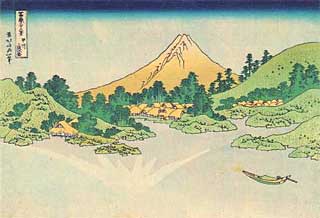
[2]
Summer at midday.
The deck of a tea house on the tan road to Kyoto
is almost full of men and women.
Two brusque men work on their master's carriage.
Two others pause for a nap.
A courtesan demands her favourite drink,
adding quite haughtily
"That you are tired does not matter to us."
Only one heeds with kind regard
the voluptuous plain,
Mount Fuji on the horizon,
the cities beyond.
A group which imitates the leaders
of certain nations today.
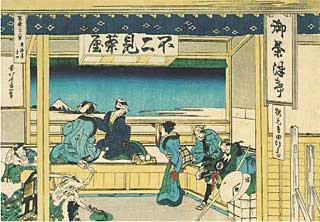
[3]
The gifted artist devoted this panel to a
scene
that evokes the refined tea-house tableau
but is, we deduce with careful study,
almost the opposite.
The building is bigger, grander:
not a house of commerce and commotion
but a noiseless temple of silent sanctuary.
Nearly everyone is staring at the fine view of Fuji.
The small girl, her view of the vista blocked,
ponders the old riddle:
If a peak dwells in the distance
but is hidden, does it exist?
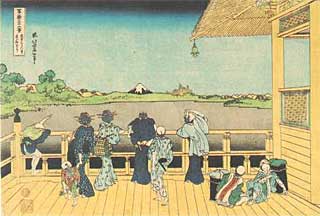
[4]
Footsteps go east.
Two sufferers, a weatherman and his wife,
hunker down to run through hueless snow
on the dead, lifeless, ice-bound turf
back to their little hut on the dew-fogged top
of Edo's storied mount.
Inside, a buttercup flower
in a kettle on a naked table:
the third thing in danger
of being dead before the cherry blossoms break.
Death before dishonor is their shared motto.
(If politicians followed that rule
only about seventeen
would remain breathing today.)
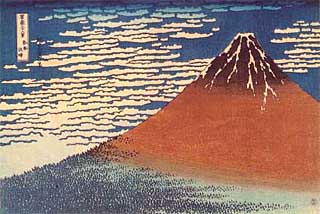
[5]
Gray-tinted clouds befogging the base
are fouled with piercing zigzags of pure white
as heavy rain runs down slopes to the basin below.
The peak tries hard to stay unspoilt,
but it may or may not;
The mountain does not speculate,
nor the awful deluge.
Hidden from view,
a wealthy samurai bows his head,
rebukes in gruff tones
the rough path his feet walk upon
then thinks a while.
The round ruddy sun sets,
painting his mountain's profile fiery red.
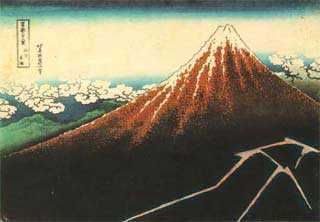
[6]
A large conifer claims its dominance
in the center of this oddly phallic vista.
Below, curious men attempt to measure its girth,
encircling its woody body beneath
the dense timber and rugged matter,
even as protruding pine needles and offshoots
scratch and hurt them.
Up there in the heated canopy
blue birds live with the quail
in nests made of new shoots;
Chaos, pain, weapons, or mythological dragons are not found.
While at the severe woodland's leafy bottom,
everything is weighty.
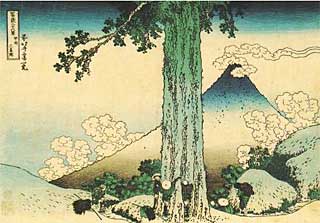
[7]
The tired fisherman perches there
on the cramped rock, holding four lines
in the turgid updraft of water
that lashes and breaks unto the shore.
A small figure (son or daughter, perhaps)
holds a basket of surf clams, tuna, damp cereals:
their nutriment for the coming days of heavy work
with plow and web and cogged wheel.
So in accord with nature
are the widower and kid
they fail to notice how often their tableau
imitates that renowned formation,
Mount Fuji.
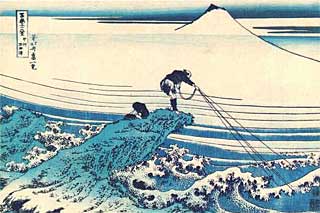
[8]
Going west on Tokaido Road
seven humpbacked travelers are beset
with a sudden gust of wind
that sweeps down the highway,
scattering papers here and there
under gray leaves which fly through the air like dead fowls.
Outwitted and confused by
the drama of streams and currents taking place there
no one even notices this:
The papers that hold the weighty writings of
The Great Teacher,
once believed to be so classic and essential,
are blank as the face of Fuji.
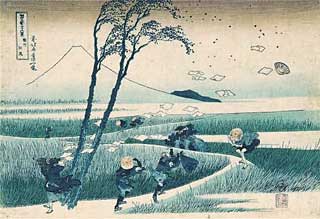
[9]
Pinnacles are rarely reached easily.
Ever since the master drew this great water scene,
all waves are expressed
(knowingly or not)
by how they match
its rugged nucleus of foam and fluid.
Mad men in miniature schooners go by,
Heaved on fat swells high up in the air
then (ebb inevitably pursuing flow) earthward.
Shipmates cast off dire hopes.
Quiet pervades the peak.
As dusk falls like a knitted blanket
we apprehend Fuji's rueful theme:
Summits easily reached rarely are pinnacles.
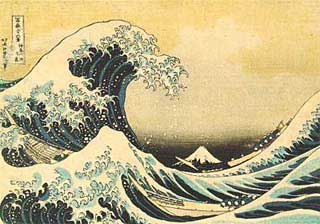
In addition to being an anagram, the construction of these poems (each having exactly 81 words) was governed by another constraint, which is revealed by applying this procedure to each of the nine poems:
- Arrange the poem's 81 words in a 9x9 square, in the obvious way: by writing the words, in order, in 9 lines of 9 words each.
- Make a 9x9 grid of numbers, Grid D (for Divisibility), where each cell has the number "1" if the sum of the letter values in the corresponding word (using A=1, B=2, C=3 etc.) is exactly divisible by 9, or "0" if it is not.
- Make another grid of numbers, Grid L (for Length), with a "1" in each cell if the corresponding word has exactly nine letters, or "0" if it does not.
(Note that the rules for Grid D and Grid L are both based on the number 9, in keeping with the theme of nineness.)
For example, here are the grids for the final poem:
GRID D (the 1's mark
the locations of the words with letter-sum divisible by 9)
0 0 0 0 0 0 0 0 0
0 0 0 0 0 0 0 0 0
0 0 0 1 0 0 1 0 0
0 0 0 0 0 1 0 0 0
0 0 1 1 0 1 1 0 0
0 0 0 0 1 0 0 0 0
0 0 1 1 1 1 1 0 0
0 0 0 0 0 0 0 0 0
0 0 0 0 0 0 0 0 0
GRID L (the 1's mark the locations of the 9-letter words)
1 0 0 0 0 0 0 0 0
0 0 0 0 0 0 0 0 1
1 0 0 0 0 0 0 0 0
0 0 0 0 0 0 0 0 1
1 0 0 0 0 0 0 0 0
0 0 0 0 0 0 0 0 1
1 0 0 0 0 0 0 0 0
0 0 0 0 0 0 0 0 1
0 0 0 0 0 0 0 0 1
Next, form Cube D and Cube L by stacking the grids for the nine poems - poem #1 on top, #2 directly under it, then #3, and so forth. Imagine building Cube D and Cube L (each being a 9x9x9 arrangement of 729 small cubes) out of physical materials, with the following rule: a small cube labelled "0" is made with transparent glass, a "1" cube with solid wood.
Now for the final step. Suspend Cube D and Cube L in a room and shine four beams of light at them: from the top and right onto Cube D and from the front and right onto Cube L. The shadows cast by the cubes on the walls and floor are shown in the picture below, which was created using a computer graphics model of the two cubes:

The shadows make reasonable renderings of four Japanese Kanji characters which are especially pertinent to the anagram:
The red shadow is the symbol for fire.
The green shadow is the symbol for mountain.
Put together, these make the compound Kanji symbol
("fire-mountain") for volcano.
The white shadow is the symbol for wealth, pronounced FU
The blue shadow is the symbol for samurai, pronounced JI
Put together, these make the compound word Fuji, the name of
the mountain.
